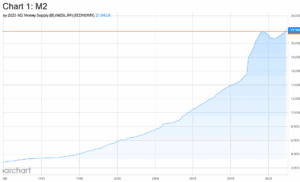It is typically a fool’s errand to bet against the U.S. consumer. Quite frankly, we love to shop and spend. That’s why I’m concerned about the second report in just a week that shows consumer reticence. After a weak UMich sentiment report last Friday, January Advance Retail Sales disappointed today.
The seeming nervousness of US consumers is nagging at me this morning. There is really no way to sugarcoat the January Advance Retail Sales report. Sure, revisions blunted some of the damage, but a headline drop of -0.9% when -0.2% was expected and a Control Group of -0.8% vs. +0.3% exp is quite staggering. There were some who expected that we might see a pre-tariff bout of spending, but if we did, that seems to be over.
Now combine the Retail Sales data with last week’s University of Michigan data that showed sentiment that dropping from 71.1 to 67.8 and 1-year inflation expectations that jumping to 4.3% from 3.3%. The latter usually follow pump prices, but they barely budged. It’s one thing to hear what people intend to do, or what they may be thinking, via a survey. It is another to see what actual data reveals about their activities.
This is where stocks and bonds might need to diverge. Stocks rallied yesterday, at first because bonds decided that the hot PPI print would not affect Core PCE, and then because the latest tariff announcement was rather vague. This morning, yields are understandably lower, but stocks seem to be taking their lead from them despite the unpleasant economic message that is causing the move.
Remember the consumer is about 2/3 of the economy, and if something is bugging them, that will be felt in GDP. We recently wrote about how we might be underappreciating the role that fiscal policy played in the recent economic and market advance, noting that reversing the “G” in the equation GDP=C+I+G+NX could negatively impact GDP. Now it looks as though the much bigger “C” might be a problem as well. As much as traders crave lower rates, a strong economy is ultimately better for stocks than a weak economy that induces lower rates. (Of course, the 2024 scenario of a solid economy AND rate cuts is ideal.)
Looking forward, the positive scenario from today’s data is this: rates ease as the economy moderates and the consumer weakness is a blip that doesn’t impact investors’ love affair with stocks
The flipside is a much worse scenario: the consumer and the government both slam their wallets shut, impacting GDP faster than the Fed is willing or able to operate.
The base case is probably somewhere in between. But that points back to our oft-repeated mantra, “don’t fight the tape, insure against it instead”. Market momentum is too strong to fight right now, but there are sufficient pitfalls. Notice I that haven’t really discussed tariffs today, let alone the potential that tax cuts undo fiscal discipline or the risk of deflation emanating from China’s real estate debt. All of which have non-zero probabilities that could disrupt the currently copacetic market. Remember, the point of insurance is not for it to pay off, it’s to prevent the buyer from being wiped out by low-probability, high-outcome events (fire, collision, medical emergencies). The same applies to stocks.
Join The Conversation
For specific platform feedback and suggestions, please submit it directly to our team using these instructions.
If you have an account-specific question or concern, please reach out to Client Services.
We encourage you to look through our FAQs before posting. Your question may already be covered!
Leave a Reply
Disclosure: Interactive Brokers
The analysis in this material is provided for information only and is not and should not be construed as an offer to sell or the solicitation of an offer to buy any security. To the extent that this material discusses general market activity, industry or sector trends or other broad-based economic or political conditions, it should not be construed as research or investment advice. To the extent that it includes references to specific securities, commodities, currencies, or other instruments, those references do not constitute a recommendation by IBKR to buy, sell or hold such investments. This material does not and is not intended to take into account the particular financial conditions, investment objectives or requirements of individual customers. Before acting on this material, you should consider whether it is suitable for your particular circumstances and, as necessary, seek professional advice.
The views and opinions expressed herein are those of the author and do not necessarily reflect the views of Interactive Brokers, its affiliates, or its employees.




















Another excellent article, thanks Steve. Yet today the mkt seems to have said, “Damn the [consumer sentiment] Torpedoes, Full Speed Ahead!…” The JPM collar short strike on the SPX for March OPEX is coming into range if the [untrustworthy in my opinion] march higher continues. So many factors coming into place to challenge the Bulls, seasonality being one of them that’s always been around “this time of year” coming up soon. Waitin’ for the top, chambering some tactical shorts on the S&P micro e-mini, finger not on the trigger yet….
Risk is rising
The last 4 years have been pretty rough for the average person. At first it seems like you adjust for it but after a while it becomes apparent that either you go into too much debt or or you cut back. It will take a long time to get over the last adminstration